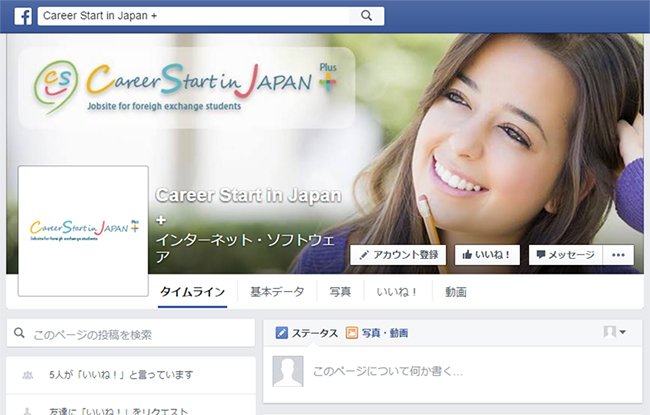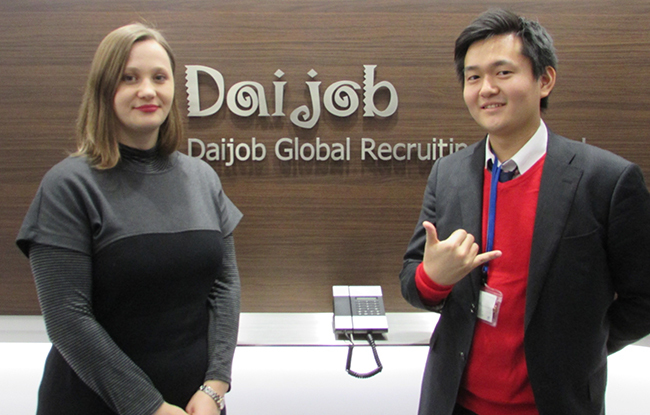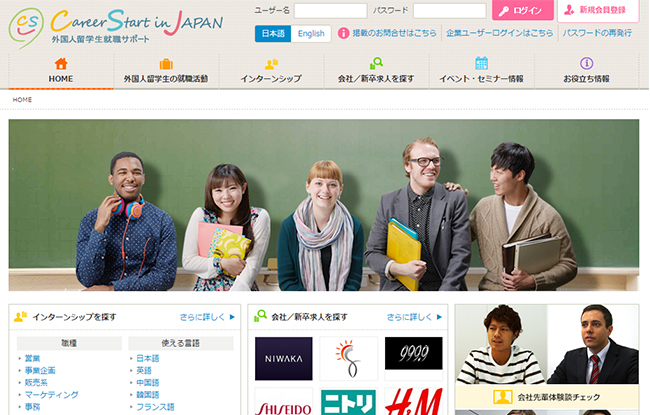News & Report
NEWS2016/03/24
Career Start in Japan + (Plus) launches on March 24th, sharing job-hunting information in English.
More than half of foreign exchange students answer, they would like to search for jobs in English.
Daijob Global Recruiting Co., Ltd., a subsidiary of Human Holdings Co., Ltd. headed by Mr. Yuji Shinohara, starts the Facebook Page for Career Start in Japan, a service for foreign exchange students of Japan searching for a job. The Facebook Page is titled, “Career Start in Japan + (Plus)” (https://www.facebook.com/CareerStartinJapanPlus/) the page will be used to share information regarding the job-hunting process in Japan.
 According to the survey results by our users on Career Start in Japan, 48% use the English language to search for a job. Also 52% have answered they would prefer to find information using English.
According to the survey results by our users on Career Start in Japan, 48% use the English language to search for a job. Also 52% have answered they would prefer to find information using English.
There are many services to support foreign exchange students in Japan to start their job-hunting; however, most of them use the Japanese language. According to a representative from the career support center of a university, usually foreign exchange students start the job-hunting about a month later compared to the Japanese students. In order to keep the foreign exchange students updated we have launched “Career Start in Japan + (Plus)” which will provide students the schedule, news articles, business manners of Japan, and event information matching the unique Japanese job-hunting schedule.
We have interviewed two of our employees involved with Career Start in Japan. First,
“Career Start in Japan + (Plus)” will be managed by Keita Ueno (Also Known as Luke) who lived outside of Japan since 3, and entered Daijob Global Recruiting Co., Ltd as a new graduate after graduating university in Hawaii. Next is Anna Timofeeva, Russian Native, who is in charge of the sales of CSJ since its first launch. The two share their experience of job-hunting and working in Japan.
◆What did you struggle with when searching for a job in Japan?
 Anna: As a new graduate, I entered a Japanese company in Russia which was introduced by my professor so it was not very hard. However, when I decided to change jobs, it was very tough. The reason was, I did not have much information about job openings, even if I score an interview, due to English not being my native language I was rejected. Looking for a new job outside of Russia was definitely tough mentally.
Anna: As a new graduate, I entered a Japanese company in Russia which was introduced by my professor so it was not very hard. However, when I decided to change jobs, it was very tough. The reason was, I did not have much information about job openings, even if I score an interview, due to English not being my native language I was rejected. Looking for a new job outside of Russia was definitely tough mentally.
Luke: Attending a school in Hawaii or USA, I decided to do job hunting during my winter vacation. I struggled with the Rirekisho and Entry sheets, the reason is, writing in Japanese is quite tough for me. So every time I see “Rirekisho (Handwritten) I did not even bother entering or considering those companies. Also, having to communicate with the representatives in Japanese was tough as well.
◆What is your challenge of working for a Japanese company?
Anna: Japanese companies are very strict on following rules, also I was still a new graduate so it was hard not having my opinions heard. Also, getting a paid vacation is tough as well.
Luke: I took a class in University which was a real-world preparation course. However, since what I have been taught was American style, it was very useless in Japan. Examples will be how to give your business card, not to drink the water until being told you can. Also I was shocked because Japanese business culture is overly polite compared to United States.
In addition, I spent most of my years in the United States, therefore very Americanized, also my keigo is another weakness I have. Also, my name is “Keita Ueno” a Japanese name, so many in Japan will speak to me like any other Japanese. So, speaking on the phone or doing business at first was definitely a challenge. After adding a nickname called “Luke” clients became interested in my background so communicating became much easier for sure.
◆Advices for Foreign Exchange students in Japan looking for a job?
Anna: Well, there are negative comments and opinions like, “Your Japanese level must be N1 to work in Japan” if willing to and wanting to work in Japan, it is important to stay strong and keep on searching. Personally I go by, “When in Rome, do as the Romans do”. It is not a complete requirement to follow every single rules of Japan, but accepting these rules is also important when working in Japan.
(*)【RU】Cо своим уставом в чужой монастырь не ходят
Luke: I think it is the best not to worry too much about the Japanese level. Like it or not, Japanese will improve after entering the company. Also, it is important to find a company that really needs and accept you other than qualified Japanese level.
[Career Start in Japan]
Explanations of Japan`s unique job-hunting system, interviews with other foreigners working in Japan, also internship openings are available.https://csj.daijob.com/





